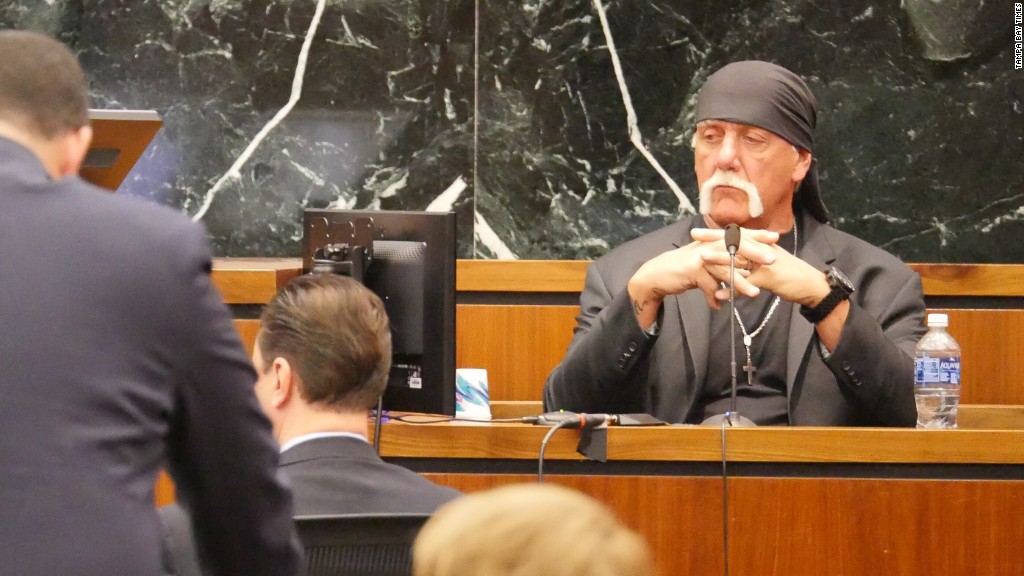
Gawker Media has filed for bankruptcy, and the bidding for its assets begins now.
On Friday, the embattled media company said it had agreed to sell all seven of its brands and other assets to the tech publisher Ziff Davis.
The Ziff Davis bid -- worth $90 million to $100 million, according to sources -- sets the floor for the bankruptcy auction process.
"The bidding begins now -- so we will find out how much others will bid," a source with direct knowledge of the process said.
The Chapter 11 bankruptcy filing in Manhattan was motivated by the company's agonizing and all-consuming legal fight with Hulk Hogan -- a court battle that was secretly funded by Silicon Valley billionaire Peter Thiel.
A spokesman for Thiel declined to comment on Friday.
Gawker Media founder and CEO Nick Denton said in a tweet, "Even with his billions, Thiel will not silence our writers. Our sites will thrive --under new ownership -- and we'll win in court."
Hulk Hogan, whose real name is Terry Bollea, also took to Twitter to respond to the news. It was the former professional wrestler's protracted legal battle against Gawker that motivated Friday's decision.
"What a beautiful day, and the good doesn't prevent the better! In the present I AM always grateful, only good happens to me," he tweeted to his more than 1.5 million followers.
The asset purchase agreement to Ziff Davis, the owner of PC Magazine, marks the start of the bankruptcy auction process. Bidding is expected to continue next week.
Denton said he was "encouraged" by the agreement with Ziff Davis, which he called "one of the most rigorously managed and profitable companies in digital media."
Ziff Davis signaled that it is interested in Gawker Media titles like Jezebel and Gizmodo, but the company's statement noticeably lacked any mention of the flagship Gawker.com, where the offending Hogan story was published in 2012.
The sale agreement to Ziff Davis will need to be approved by the bankruptcy court, which will conduct an auction to see if there is a higher offer available. Ziff Davis will be what is known as a "stalking horse bidder," whose offer for the company can be topped by other bidders.
Proceeds of the sale will go to pay off creditors, including Hogan. But that doesn't mean he will be able to collect all the money the jury awarded him. Under bankruptcy, people owed money generally receive only a fraction of what they were owed by the bankrupt company.
In March, a Florida jury awarded Hogan a staggering $140.1 million judgment in his invasion of privacy trial against the company over its 2012 publication of excerpts from his sex tape.
David Houston, Hogan's longtime personal attorney, said in a statement that his client has "every intention" to pursue that judgment, "whether it be in the bankruptcy court or any other court."
Gawker is still pushing ahead with its appeal of the judgment and has maintained confidence that it will ultimately be vindicated, but the company has been openly entertaining a sale.
Still, the news brought a sense of shock inside Gawker's Manhattan headquarters on Friday. Staffers learned of the bankruptcy filing at an all-hands meeting around noon, shortly before the news went public.
"People were surprised and saddened I would say," one Gawker Media staffer told CNNMoney. "Our independence is very central to what we do and also a big reason why a lot of us work here."
John Cook, executive editor of Gawker Media, told CNNMoney the staff was holding steady. "The decade-long legal assault from a vindictive billionaire has had the effect of making our staff pretty resilient at hearing difficult news," he said. "We're keeping our heads down and blogging."
Denton and Gawker Media President Heather Dietrick tried to reassure employees, telling them that nothing would change in the day-to-day operations until the sale is complete and that the sites would continue to function normally.
They said they were committed to finding a buyer that cares about what Gawker does.
Reaction outside the Gawker newsroom was mixed. Adversaries of the company, long known for its ruthless and snarky brand of journalism, cheered the news.
"Peter Thiel is a great American hero," tweeted conservative pundit Erick Erickson.
But Gawker had plenty of defenders, both within the journalism community and the world of politics.
"Freedom of the press is a cornerstone of our nation," tweeted New York Attorney General Eric Schneiderman. "Like them or not, sad to see NYC media giant @Gawker forced to the brink."
In truth, the ripples of Hogan's lawsuit were felt at the company before the trial even began. Earlier this year, Gawker sold a minority stake to the investment company Columbus Nova Technology Partners to gird itself against the lawsuit.
That was a first for the once-fiercely-independent media company, and a signal that the legal battle had forced Denton's hand.
Thiel, a co-founder of PayPal, confirmed last month that he has funded Hogan's lawsuit against Gawker along with others as a measure of "deterrence."
For years, Gawker's sites have pilloried Thiel, ridiculing his business failures and stridently conservative views. In 2007 one of its sites published a story titled "Peter Thiel is totally gay, people."
"Gawker, the defendant, built its business on humiliating people for sport," Thiel said in a statement last month. "They routinely relied on an assumption that victims would be too intimidated or disgusted to even attempt redress for clear wrongs. Freedom of the press does not mean freedom to publish sex tapes without consent. I don't think anybody but Gawker would argue otherwise."


